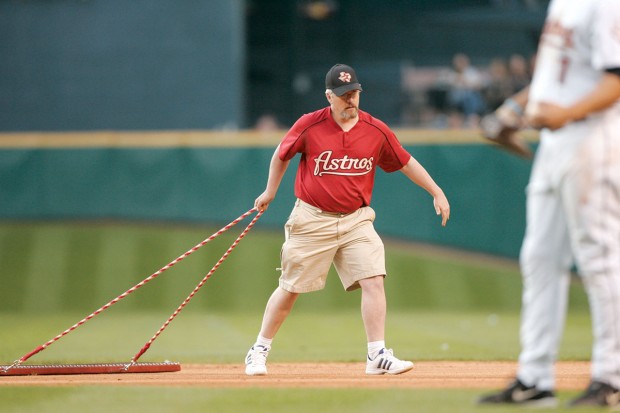This Diamond is a Gem
I've mowed a lot of grass in my time, but until this spring, I'd never sparked anyone's envy doing so.
As I worked on a recent Saturday, two men passed nearby and one grumbled, "I've worked here four years and never been allowed to cut the grass. That ain't right."
To understand, you have to realize this was no ordinary yard. This was the emerald surface of Minute Maid Park. This is where the Houston Astros play, and it's where sod and soil are treated like precious gemstones.
From 9 a.m. until 10 p.m., I had the pleasure of working on the Astros grounds crew, getting the field into pristine shape before and after a game against the Washington Nationals.
If there was any doubt this was serious business, it vanished when a crew member eyed me suspiciously as I prepared to take an unnecessary step on the grass.
"This grass is sacred," he advised sternly. "Don't walk on it if you don't have to."
Duly warned, I backed up and walked on the dirt.
If you've ever been to a major-league ballpark, you know how precise a field should look. The grass is cut in patterns to look like diamonds, squares, or maybe a sunrise. My day started on a mower, trying not to destroy the lovely diamond design that stretched out over 2.3 acres.
With a crystal blue sky overhead and purple martins swooping around the empty stadium, I mowed a surface that had been mowed only 24 hours earlier. It was hard to believe that there was any grass to cut. But when I looked inside the grasscatcher, there was a small pile of blades, each piece cut so fine it looked as if a chef had diced it up on a cutting board.
Because of the roof and the long shadows caused by the boxy shape of Minute Maid Park, grass is hard to grow here. Particularly in the spring, when the growing days are short and the turf must fight to get established. The ryegrass is a little thin in a few places, but it looks healthy enough to survive until May, when it will be ripped out and replaced with a summer surface--seashore paspalum, a grass native to cloudy, coastal climates like those in Africa.
The guy who has to decide what fancy grass to use and when to use it is Dan Bergstrom.
“I grew up on a farm in Iowa. I knew I wanted to work outside, but I thought I didn’t want to farm,” the head groundskeeper explained about his career path. “Now I am farming grass in the middle of the city.”
While grass is important, Dan spends most of his workday thinking about dirt. And not ordinary dirt, but a red clay trucked in from Northern Alabama specifically for this purpose.
Because 70 percent of all baseball plays happen in the infield, and 90 percent of those infield plays involve the dirt surface, no part of the diamond is more critical. It can’t be too hard or too soft. A baseball player expects his spikes to sink into the clay, and he expects the spikes to come out with nothing sticking on them.
To achieve that perfection, we spent a lot of time raking dirt, edging lines where grass and dirt meet, even brushing the soil down smooth with brooms. We watered the playing field four separate times before the game started. Watering is a job for at least four men, because we couldn’t allow a heavy hose to be dragged around, ripping the grass and furrowing the dirt. So we carried it on our shoulders like a giant, green anaconda. I spent a good part of my Saturday doing this, and it was a lot more fun than it sounds.
“You have to love baseball to do this kind of work,” said Willie Berry, a member of the Astros grounds crew for 35 years.
Willie worked for 27 years in the old Astrodome. He even had to wear the absurd astronaut outfits the crews wore back then. But his longevity and reputation for maintaining a perfect pitchers mound have made him well known around the game. Manager Phil Garner and Coach Jose Cruz seem to single him out for their special attention.
When asked what special field preparation was necessary for the World Series, Berry didn’t have to think long about his answer.
“Nothing,” he said. “We try to make it perfect every day. So there was no need to do anything different.”
And that tells you all you need to know about working with the Astros field crew.
Even the amateur attempts of a lifelong fan--happy to be on the field whatever the circumstances--couldn’t mess that up.
Editor’s Note: Greg Hassell is a contributing writer for The Buzz Magazines. If you would like to submit a story idea for Greg, please email your suggestions to [email protected].
Want more buzz like this? Sign up for our Morning Buzz emails.
To leave a comment, please log in or create an account with The Buzz Magazines, Disqus, Facebook, or Twitter. Or you may post as a guest.



